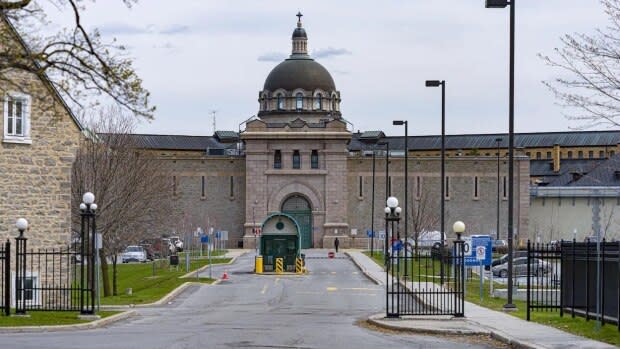Bordeaux jail not following COVID-19 public health guidelines

An inmate at Montreal's Bordeaux jail has told CBC most inmates have no access to masks and have been locked down in their cells 19 hours a day since March.
"There's only a handful of people that have masks here. I've been walking around the jail with no mask," the inmate, who asked not to be named for fear of reprisals from guards, told CBC.
"It's like they're just disregarding my safety," he continued.
This is happening after the Quebec government passed a law requiring people to wear masks in all public indoor spaces.
In a statement, Quebec's public security ministry confirmed some inmates at Bordeaux haven't been given masks, although it said the jail is now addressing that.
"Since the onset of the health crisis, procedure masks have been issued to inmates housed in warm and hot zones of the establishment," the statement said.
"Subsequently reusable face covers were distributed progressively to all people imprisoned in Bordeaux starting June 2, 2020," the statement continued.
The inmate CBC spoke to said he's never been offered a mask, and that very few other inmates on his range have one.
He said some prisoners have made their own masks out of T-shirts.
CBC spoke to the inmate by phone from the jail, where he's been for several months.
Bordeaux, built more than a century ago, is the largest provincial jail in Quebec, accommodating up to 1400 male prisoners.

Most are awaiting trial or sentencing, while some are serving sentences of less than two years.
At least 96 inmates and 39 staff members at Bordeaux have tested positive for COVID-19, and one inmate died in May.
Cellmates can't social distance
The inmate CBC spoke to said inmates are normally allowed outside their cells 14 hours a day. Since March, he said, that's been cut to just five.
Most inmates share a small cell with another inmate.
The public security ministry confirmed inmates are spending more time in cells.
"Living arrangements of the regular sectors have been revised so that inmates have access to common areas in small groups, in order to facilitate respect for social distancing," the ministry statement said.
"This is why the out-of-cell time may be reduced in some cases," it continued.
The inmate told CBC it makes social distancing next to impossible.
"Just being in your cell can cause tension with you and the person you live with, because you're with them so much with no personal space in such a small area," the inmate said.
He said even during the few hours a day inmates are allowed in common spaces, social distancing is difficult to maintain.
"There's no way to stay two metres apart when you're on the range and you're on the phone. There's three phones all right next to each other," he said.
Ministry says social distancing being followed
The public security ministry contends inmates should be able to maintain social distancing.
"The Directorate-General of Correctional Services ensures that it complies with public health recommendations in order to avoid any practice that would endanger the health and safety of inmates," the ministry statement said.
"It is therefore possible that two people will be imprisoned in the same cell if these conditions are met," it continued.

Alain Babineau, a former RCMP officer who is now an activist with the Centre for Research Action on Race Relations, told CBC the inmates are being put in an impossible situation when it comes to masks and social distancing.
"How can they follow instructions if the institution makes it impossible for them to follow?" Babineau said.
"Not only is their health being put at risk, but then they can't comply with the restrictions so they're getting doubly punished," he continued.
"Basic human rights and accommodations are being denied to these folks."
No books, gym, AA meetings
In addition to public health risks, boredom, restlessness and isolation are creating tension at Bordeaux.
"Visits to inmates, Alcoholics Anonymous and Narcotics Anonymous support groups as well as volunteer activities have been suspended since March 14," the ministry confirmed to CBC.
The inmate said that means there's been no access to the gym or to any books or magazines for months.
"When you're in jail you're supposed to be rehabilitated. You're supposed to be doing things that are rehabilitating yourself. We can't even get a book from the library," the inmate said.
He said that leads some inmates, who might otherwise behave, into trouble.
"A lot of people don't want to be a product of their environment when they're trying to escape that. It's like you're being forced to just blend in with whatever the range is doing. And that's not good," he continued.
"When people don't have nothing good going on, everything bad starts happening," he added.
On top of that, inmates have been unable to have visits from family members. The inmate said he misses his mother and grandmother. He said the jail was trying to set up online visits, but that's not practical for many inmates whose families don't have computers.
"My mother doesn't have a laptop. I've never had a laptop or a computer in my life. Now for me to be able to see my mother you're telling me she has to go out and buy a laptop?" he said.
"I don't think they seem to grasp that we're on these lockdowns because of a pandemic situation. I feel like they treat us like we're on a punishment lockdown," the inmate added.
Services, visits to gradually resume
The ministry said visits and other services will return, but not anytime soon.
"The ministry has drawn up a plan for the gradual resumption of normal activities in detention facilities which provides, in particular, for the return of in-person visits during the fall of 2020," the ministry said.
"The resumption dates may however vary depending on the period, according to the sanitary instructions of the public health authorities in force at the time," it continued.
The union representing prison guards said the resumption of activities is happening too quickly.
"We have seen in Bordeaux what happens when the disease enters a detention facility," Nathalie Arguin, president of the Federation of Public Service Employees said in a statement released earlier this week.
"The government often claims to fear a second wave of COVID-19, so it's hard to understand why it is so urgent to reduce protective measures in prisons," Arguin said.


